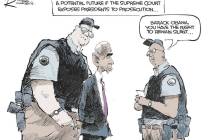Texting, speeding, and cheap gas are killing more of us
I had a friend in college who saw the good in most things despite evidence to the contrary. She believed passionately that the federal government had imposed a 55 mph speed limit in the 1970s to save lives. She lost the bet — and maybe a little faith in government? — when she learned that it had been done to save gas.
So here we are in 2016, and the National Safety Council has issued a report last week saying that traffic fatalities have risen dramatically for the second consecutive year — an estimated 9 percent more over just the first six months this year. It seems almost quaint these days to think the government would do anything to change that, unless there’s another oil embargo.
The Council, citing preliminary estimates, says more than 19,000 people have been killed on the nation’s highways since January 2016, compared to the same period a year earlier. This a figure that’s nearly 20 percent higher than the number two years earlier.
The jump in fatalities can be attributed at least in part to cheap gas and a decent economy, the Council says. Average gas prices are 16 percent lower this year, compared with 2015, and the mileage people have driven is up 3.3 percent. More people are dying because people are putting in more time on the road..
But that’s half the story. Part of the reason for the increase in traffic deaths is also that speed limits have gone up. Part of the reason is the smartphone in your hand. Part of the reason is government inaction. Or apathy.
Keep in mind that the increase in traffic deaths comes despite advances in the safety design of vehicles and roadways, increased use of safety belts, and success in the fight against drunk driving. But higher speed limits are here to stay as long as we can tolerate the death toll. And little has been done to combat the habit of texting and driving despite mounting evidence that this is killing people.
Deborah A.P. Hersman, president and chief executive of the National Safety Council, told me she has little doubt that the increase in traffic deaths can be attributed to the distracted driving and the ubiquitous use of smartphones and other technology in people’s cars. But she said the data do not yet show a definitive link, perhaps because crashes are reported in a way that doesn’t capture the impact of distracted driving.
For one thing, the driver might not be around to admit he was texting at the time. Or he might lie. “We know that this data is flawed in crash reports,” she said.
But the evidence that distracted driving has gotten out of control — especially from talking or texting with a smartphone — is all around us. It’s in surveys where people say they hate that other people text and drive but admit to doing the same. It’s in over-the-road research where drivers are monitored as they travel. It’s in roadside traffic counts where researchers observe passing vehicles. It’s in news accounts of fatal crashes and in lawsuits. It’s right before our eyes, if you’ll take a moment to lift your head from your phone.
“We know that it’s very prevalent,” Hersman said. “We know that the people that we’re friends with, our family, people we love, we know people are doing this even though they shouldn’t be. And our surveys bear that out.”
But neither automotive manufacturers, the smartphone and wireless industry, nor the federal government gives a hoot. It’s probably because cracking down on the use of electronic devices behind the wheel would mean making a lot of people mad or putting a dent in all that money flowing through the online economy.
Speed also plays a large factor. Since 1995, 38 states have raised the speed limit to 70 mph or higher, according to the National Conference of State Legislatures. Some states, including Montana, Nevada, South Dakota, Utah and Wyoming have boosted the maximum speed to 80 mph.
The NCSL, citing a study by the Insurance Institute for Highway Safety, says an additional 33,000 people have died because of those higher speed limits in the past 20 years. That’s nearly as many Americans as were killed in the Korean War.
But never mind. We’ll just have to wait for OPEC to cut off the oil again.
Or a global shortage of smartphones.
Fredrick Kunkle runs the Washington Post’s Tripping blog, writing about the experience of travel.























